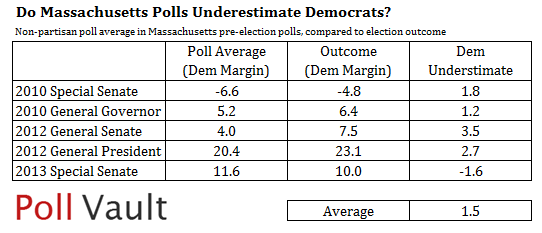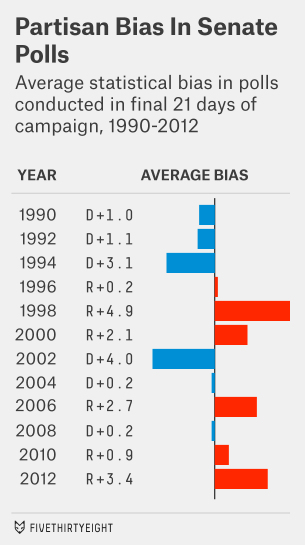Advertisement
Why 'Tied' In Polls Might Actually Mean An Edge For Coakley
With just two weeks (and a day) to go, the race for governor is very close to a tie. A number of polls over the last few weeks have shown either a tie or either candidate a point or two ahead. The others cancel each other out in poll averages, leaving us with a race that looks too close to call. If the race goes into Election Day with polls showing a tie, recent history suggests it is probably better for Democrat Martha Coakley.
[asset]2014/0929_baker-coakley/[/asset]
This is because polls in recent Massachusetts election cycles have, as a group, tended to be slightly biased toward the Republican when compared to the final election result. In four of the last five statewide contests, the polls have underestimated Democratic performance by between 1.2 and 3.5 points. The only exception was 2013, when two outlier polls that showed Democrat Ed Markey leading by 20 points pulled the average more toward the Democrats.

But most of the evidence suggests there is a slight rightward lean to the polls in recent cycles. In 2012, for instance, all of the public polls conducted from mid-October onward underestimated Elizabeth Warren's margin in her bid for U.S. Senate. Individual polls have gotten the margin right in specific elections. But overall, Democrats have slightly beaten the expectations set by the aggregate of public poll data. So if the polls have it perfectly tied (as some do), Charlie Baker's camp has reason to be more nervous than team Coakley.
There are various possible explanations for this. A popular one among Democrats is their turnout machine pulls more Democratic-leaning voters to cast ballots on Election Day than are shown in pre-election polls. Another possible explanation is that Democratic voters make up their minds in the last few days of a campaign cycle, after pollsters have stopped collecting data.
 Or it may be that Massachusetts is reflective of the nation as a whole, where polls have been a bit biased toward Republicans over the last two cycles. This chart from FiveThirtyEight shows the size and direction of poll bias by election cycle. The 2010 and 2012 cycles both featured a Republican bias. So if Massachusetts is simply reflecting the national trend, poll performance here may not be an artifact of anything specific to Massachusetts. And as the chart shows, the size and direction of the bias varies between cycles, meaning the outcome of last few cycles may not be indicative of what will happen this year.
Or it may be that Massachusetts is reflective of the nation as a whole, where polls have been a bit biased toward Republicans over the last two cycles. This chart from FiveThirtyEight shows the size and direction of poll bias by election cycle. The 2010 and 2012 cycles both featured a Republican bias. So if Massachusetts is simply reflecting the national trend, poll performance here may not be an artifact of anything specific to Massachusetts. And as the chart shows, the size and direction of the bias varies between cycles, meaning the outcome of last few cycles may not be indicative of what will happen this year.It’s hard to attribute the rightward lean of Massachusetts polls to methodological problems with the polls, since there have been a somewhat different set of pollsters working in each of these elections. While we now have a stable of homegrown, nonpartisan pollsters, this was not the case as recently as 2010. In the 2010 special Senate election, just one of the polls in the final week of the campaign, when Republican Scott Brown took the lead, was conducted by an in-state pollster. Now, not a week goes by without multiple releases from Massachusetts pollsters. But even as the pollsters have changed, the under-performance by Republicans relative to the polls has continued.
There is no guarantee that this pattern will repeat itself this year. But the direction of the slant has been consistent enough in recent cycles that it should keep Republican strategists with their foot on the gas, even if the polls start to show Baker with a lead.